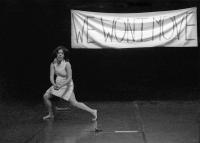 When Sarah Bergh and Sandra Chatterjee asked me to write some thoughts about Dance, Body and Protest, one of the first thing, that I remembered was one of my dance productions called Permanent Prints (1999), premiered at Kampnagel Hamburg. This production was a triptych, constituted of three different choreographic works, one of those pieces, we called it Duett, casted by myself and Cristina Moura. While the audience rushed into the theater space we would be on stage, sitting at a chair, looking at the audience, with an empty look, the set-design was a self-written banner hanging above our heads, on which we could read the statement „We won’t move“. My main concern was to bring up themes for reflection such as multicultural identities (today I would have used the terminology ‚body of cultures‘), gender, racism, sexism, and social political conflicts. Dancer and choreographer Angela Guerreiro has never performed unclothed in her solos or pieces; instead, she has addressed multicultural identity and gender issues, racism, sexism and (social) political conflicts in her work.
When Sarah Bergh and Sandra Chatterjee asked me to write some thoughts about Dance, Body and Protest, one of the first thing, that I remembered was one of my dance productions called Permanent Prints (1999), premiered at Kampnagel Hamburg. This production was a triptych, constituted of three different choreographic works, one of those pieces, we called it Duett, casted by myself and Cristina Moura. While the audience rushed into the theater space we would be on stage, sitting at a chair, looking at the audience, with an empty look, the set-design was a self-written banner hanging above our heads, on which we could read the statement „We won’t move“. My main concern was to bring up themes for reflection such as multicultural identities (today I would have used the terminology ‚body of cultures‘), gender, racism, sexism, and social political conflicts. Dancer and choreographer Angela Guerreiro has never performed unclothed in her solos or pieces; instead, she has addressed multicultural identity and gender issues, racism, sexism and (social) political conflicts in her work.
Stages
28.03.2023 | by Angela Guerreiro
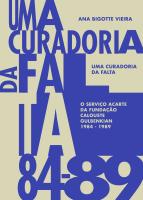 The questions raised by Ana Bigotte, on the contrary, are not formulated in the strict disciplinary framework of art history, but from the porous and open framework of theory and cultural studies, taking as fundamental references the work of authors such as Luís Trindade or Boaventura de Sousa Santos, whose object goes beyond the specific sphere of the artistic to approach culture as a social process with multiple branches. It does so by following the path opened by André Lepecki, who formulated interesting hypotheses about the construction of the Portuguese social "body" from the study of dance and performance. This is another distinctive specificity of the Portuguese case that contrasts with that of the neighboring country: the focus on the arts of the body and the so-called "living arts", such as theater, dance, and music.
The questions raised by Ana Bigotte, on the contrary, are not formulated in the strict disciplinary framework of art history, but from the porous and open framework of theory and cultural studies, taking as fundamental references the work of authors such as Luís Trindade or Boaventura de Sousa Santos, whose object goes beyond the specific sphere of the artistic to approach culture as a social process with multiple branches. It does so by following the path opened by André Lepecki, who formulated interesting hypotheses about the construction of the Portuguese social "body" from the study of dance and performance. This is another distinctive specificity of the Portuguese case that contrasts with that of the neighboring country: the focus on the arts of the body and the so-called "living arts", such as theater, dance, and music.
Stages
06.03.2023 | by Jesús Carrillo
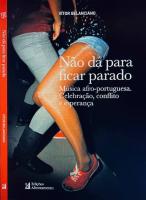 The relevance of black participation in Portugal in the most diverse areas - including music - dates back several hundred years, but is rarely articulated in dominant public narratives. It is not, of course, that blacks in Portugal have no voice or are not present in the daily life of the country. It's often about talking without being considered, seeing without being seen, singing without being listened to - at least outside a cultural sphere that tends to be more circumscribed.
The relevance of black participation in Portugal in the most diverse areas - including music - dates back several hundred years, but is rarely articulated in dominant public narratives. It is not, of course, that blacks in Portugal have no voice or are not present in the daily life of the country. It's often about talking without being considered, seeing without being seen, singing without being listened to - at least outside a cultural sphere that tends to be more circumscribed.
Stages
01.02.2021 | by Inês Nascimento Rodrigues
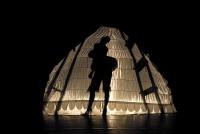 South Africa´s theatre gains international recognition for its performance arts productions due to applying diverse aesthetics and the search of new stage approaches by many different artists. In addition, regularly scheduled national and international dance, performance art and theater festivals are organized like Invecting the City in Cape Town, Dance Umbrella in Johannesburg, and National Arts Festival in Grahams Town etc.
South Africa´s theatre gains international recognition for its performance arts productions due to applying diverse aesthetics and the search of new stage approaches by many different artists. In addition, regularly scheduled national and international dance, performance art and theater festivals are organized like Invecting the City in Cape Town, Dance Umbrella in Johannesburg, and National Arts Festival in Grahams Town etc.
Stages
07.03.2012 | by Grit Köppen
 The most interesting things happen often completely unexpected. On a trip to Nairobi, being busy with the Solo and Duo Festival of Dance Forum Nairobi I came along the dynamics of inspiring artists in the GoDown Art Centre located in the industrial area of town. There I had the coincidental chance to meet the dancer Irene Karanja in a daily rehearsal program for a dance show choreographed by Fernando Anuang´a. Her artist name is short: Renée.
The most interesting things happen often completely unexpected. On a trip to Nairobi, being busy with the Solo and Duo Festival of Dance Forum Nairobi I came along the dynamics of inspiring artists in the GoDown Art Centre located in the industrial area of town. There I had the coincidental chance to meet the dancer Irene Karanja in a daily rehearsal program for a dance show choreographed by Fernando Anuang´a. Her artist name is short: Renée.
Stages
28.12.2011 | by Grit Köppen
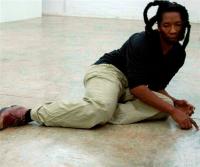 "I think there are so many misconceptions about African cultures. Besides, I use the ideas of used objects for rituals, but the material is different. Sometimes I abstract additionally the movements of such rituals. Anyway, I feel the need to alienate ritual elements; they mainly serve as an inspiration for me".
"I think there are so many misconceptions about African cultures. Besides, I use the ideas of used objects for rituals, but the material is different. Sometimes I abstract additionally the movements of such rituals. Anyway, I feel the need to alienate ritual elements; they mainly serve as an inspiration for me".
Stages
11.10.2011 | by Grit Köppen
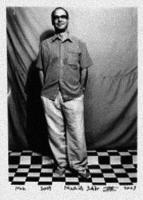 A particular cultural expression results from an expectation that a group has in relation to the culture and the world, but also in its hereditary burden, in what, in the English-speaking world, is well called heritage. Of course, because of tradition or expectation, many of these cultures and groups come into conflict. It may be productive, since it is assumed as a normal part of democracy. As there is negotiation between groups and cultural expressions, where the intervention in the city and political and social issues cannot be replaced by culture, we find ourselves in a rich and democratic situation. Cultural productions should translate that.
A particular cultural expression results from an expectation that a group has in relation to the culture and the world, but also in its hereditary burden, in what, in the English-speaking world, is well called heritage. Of course, because of tradition or expectation, many of these cultures and groups come into conflict. It may be productive, since it is assumed as a normal part of democracy. As there is negotiation between groups and cultural expressions, where the intervention in the city and political and social issues cannot be replaced by culture, we find ourselves in a rich and democratic situation. Cultural productions should translate that.
Face to face
06.10.2011 | by Marta Lança
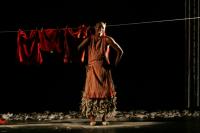 Multiple award-winning dancer, choreographer, teacher and development activist Mamela Nyamza, the 2011 Standard Bank Young Artist Award Winner for Dance, started using dance to translate the world around her as a child growing up in Gugulethu in the 1980s.
Multiple award-winning dancer, choreographer, teacher and development activist Mamela Nyamza, the 2011 Standard Bank Young Artist Award Winner for Dance, started using dance to translate the world around her as a child growing up in Gugulethu in the 1980s.
Stages
28.09.2011 | by SouthAfrica Reporter
 The solo violin playing of Isaac Molelekoa is so impressive, melancholic and space pervading that the viewers are dispelled. Extremely slow a dancer becomes visible, who stands in a narrow cone of light in the center of the stage. It is a quiet, strong and contrastive picture - this disturbing music of the violinist, that encourages you to move either internally or externally, and the continued structural integrity of the dancer Maqoma on stage.
The solo violin playing of Isaac Molelekoa is so impressive, melancholic and space pervading that the viewers are dispelled. Extremely slow a dancer becomes visible, who stands in a narrow cone of light in the center of the stage. It is a quiet, strong and contrastive picture - this disturbing music of the violinist, that encourages you to move either internally or externally, and the continued structural integrity of the dancer Maqoma on stage.
Stages
22.09.2011 | by Grit Köppen
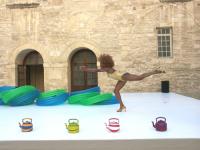 On the one hand I try to understand how African dance and as African considered corporalities are used as an aesthetic medium in common European cultural practices. How does European discourse create which images of African dance and performances? On the other hand and crucially, I focus on the African side of the coin: how do African dancers and choreographers (re)act and which are their individual choices in the scope of various challenges and do European discourse have any significance on African dancers’ and choreographers’ decisions?
On the one hand I try to understand how African dance and as African considered corporalities are used as an aesthetic medium in common European cultural practices. How does European discourse create which images of African dance and performances? On the other hand and crucially, I focus on the African side of the coin: how do African dancers and choreographers (re)act and which are their individual choices in the scope of various challenges and do European discourse have any significance on African dancers’ and choreographers’ decisions?
Stages
16.05.2010 | by Nadine Siegert
 When Sarah Bergh and Sandra Chatterjee asked me to write some thoughts about Dance, Body and Protest, one of the first thing, that I remembered was one of my dance productions called Permanent Prints (1999), premiered at Kampnagel Hamburg. This production was a triptych, constituted of three different choreographic works, one of those pieces, we called it Duett, casted by myself and Cristina Moura. While the audience rushed into the theater space we would be on stage, sitting at a chair, looking at the audience, with an empty look, the set-design was a self-written banner hanging above our heads, on which we could read the statement „We won’t move“. My main concern was to bring up themes for reflection such as multicultural identities (today I would have used the terminology ‚body of cultures‘), gender, racism, sexism, and social political conflicts. Dancer and choreographer Angela Guerreiro has never performed unclothed in her solos or pieces; instead, she has addressed multicultural identity and gender issues, racism, sexism and (social) political conflicts in her work.
When Sarah Bergh and Sandra Chatterjee asked me to write some thoughts about Dance, Body and Protest, one of the first thing, that I remembered was one of my dance productions called Permanent Prints (1999), premiered at Kampnagel Hamburg. This production was a triptych, constituted of three different choreographic works, one of those pieces, we called it Duett, casted by myself and Cristina Moura. While the audience rushed into the theater space we would be on stage, sitting at a chair, looking at the audience, with an empty look, the set-design was a self-written banner hanging above our heads, on which we could read the statement „We won’t move“. My main concern was to bring up themes for reflection such as multicultural identities (today I would have used the terminology ‚body of cultures‘), gender, racism, sexism, and social political conflicts. Dancer and choreographer Angela Guerreiro has never performed unclothed in her solos or pieces; instead, she has addressed multicultural identity and gender issues, racism, sexism and (social) political conflicts in her work.  The questions raised by Ana Bigotte, on the contrary, are not formulated in the strict disciplinary framework of art history, but from the porous and open framework of theory and cultural studies, taking as fundamental references the work of authors such as Luís Trindade or Boaventura de Sousa Santos, whose object goes beyond the specific sphere of the artistic to approach culture as a social process with multiple branches. It does so by following the path opened by André Lepecki, who formulated interesting hypotheses about the construction of the Portuguese social "body" from the study of dance and performance. This is another distinctive specificity of the Portuguese case that contrasts with that of the neighboring country: the focus on the arts of the body and the so-called "living arts", such as theater, dance, and music.
The questions raised by Ana Bigotte, on the contrary, are not formulated in the strict disciplinary framework of art history, but from the porous and open framework of theory and cultural studies, taking as fundamental references the work of authors such as Luís Trindade or Boaventura de Sousa Santos, whose object goes beyond the specific sphere of the artistic to approach culture as a social process with multiple branches. It does so by following the path opened by André Lepecki, who formulated interesting hypotheses about the construction of the Portuguese social "body" from the study of dance and performance. This is another distinctive specificity of the Portuguese case that contrasts with that of the neighboring country: the focus on the arts of the body and the so-called "living arts", such as theater, dance, and music.  The relevance of black participation in Portugal in the most diverse areas - including music - dates back several hundred years, but is rarely articulated in dominant public narratives. It is not, of course, that blacks in Portugal have no voice or are not present in the daily life of the country. It's often about talking without being considered, seeing without being seen, singing without being listened to - at least outside a cultural sphere that tends to be more circumscribed.
The relevance of black participation in Portugal in the most diverse areas - including music - dates back several hundred years, but is rarely articulated in dominant public narratives. It is not, of course, that blacks in Portugal have no voice or are not present in the daily life of the country. It's often about talking without being considered, seeing without being seen, singing without being listened to - at least outside a cultural sphere that tends to be more circumscribed.  South Africa´s theatre gains international recognition for its performance arts productions due to applying diverse aesthetics and the search of new stage approaches by many different artists. In addition, regularly scheduled national and international dance, performance art and theater festivals are organized like Invecting the City in Cape Town, Dance Umbrella in Johannesburg, and National Arts Festival in Grahams Town etc.
South Africa´s theatre gains international recognition for its performance arts productions due to applying diverse aesthetics and the search of new stage approaches by many different artists. In addition, regularly scheduled national and international dance, performance art and theater festivals are organized like Invecting the City in Cape Town, Dance Umbrella in Johannesburg, and National Arts Festival in Grahams Town etc.  The most interesting things happen often completely unexpected. On a trip to Nairobi, being busy with the Solo and Duo Festival of Dance Forum Nairobi I came along the dynamics of inspiring artists in the GoDown Art Centre located in the industrial area of town. There I had the coincidental chance to meet the dancer Irene Karanja in a daily rehearsal program for a dance show choreographed by Fernando Anuang´a. Her artist name is short: Renée.
The most interesting things happen often completely unexpected. On a trip to Nairobi, being busy with the Solo and Duo Festival of Dance Forum Nairobi I came along the dynamics of inspiring artists in the GoDown Art Centre located in the industrial area of town. There I had the coincidental chance to meet the dancer Irene Karanja in a daily rehearsal program for a dance show choreographed by Fernando Anuang´a. Her artist name is short: Renée.  "I think there are so many misconceptions about African cultures. Besides, I use the ideas of used objects for rituals, but the material is different. Sometimes I abstract additionally the movements of such rituals. Anyway, I feel the need to alienate ritual elements; they mainly serve as an inspiration for me".
"I think there are so many misconceptions about African cultures. Besides, I use the ideas of used objects for rituals, but the material is different. Sometimes I abstract additionally the movements of such rituals. Anyway, I feel the need to alienate ritual elements; they mainly serve as an inspiration for me".  A particular cultural expression results from an expectation that a group has in relation to the culture and the world, but also in its hereditary burden, in what, in the English-speaking world, is well called heritage. Of course, because of tradition or expectation, many of these cultures and groups come into conflict. It may be productive, since it is assumed as a normal part of democracy. As there is negotiation between groups and cultural expressions, where the intervention in the city and political and social issues cannot be replaced by culture, we find ourselves in a rich and democratic situation. Cultural productions should translate that.
A particular cultural expression results from an expectation that a group has in relation to the culture and the world, but also in its hereditary burden, in what, in the English-speaking world, is well called heritage. Of course, because of tradition or expectation, many of these cultures and groups come into conflict. It may be productive, since it is assumed as a normal part of democracy. As there is negotiation between groups and cultural expressions, where the intervention in the city and political and social issues cannot be replaced by culture, we find ourselves in a rich and democratic situation. Cultural productions should translate that.  Multiple award-winning dancer, choreographer, teacher and development activist Mamela Nyamza, the 2011 Standard Bank Young Artist Award Winner for Dance, started using dance to translate the world around her as a child growing up in Gugulethu in the 1980s.
Multiple award-winning dancer, choreographer, teacher and development activist Mamela Nyamza, the 2011 Standard Bank Young Artist Award Winner for Dance, started using dance to translate the world around her as a child growing up in Gugulethu in the 1980s.  The solo violin playing of Isaac Molelekoa is so impressive, melancholic and space pervading that the viewers are dispelled. Extremely slow a dancer becomes visible, who stands in a narrow cone of light in the center of the stage. It is a quiet, strong and contrastive picture - this disturbing music of the violinist, that encourages you to move either internally or externally, and the continued structural integrity of the dancer Maqoma on stage.
The solo violin playing of Isaac Molelekoa is so impressive, melancholic and space pervading that the viewers are dispelled. Extremely slow a dancer becomes visible, who stands in a narrow cone of light in the center of the stage. It is a quiet, strong and contrastive picture - this disturbing music of the violinist, that encourages you to move either internally or externally, and the continued structural integrity of the dancer Maqoma on stage.  On the one hand I try to understand how African dance and as African considered corporalities are used as an aesthetic medium in common European cultural practices. How does European discourse create which images of African dance and performances? On the other hand and crucially, I focus on the African side of the coin: how do African dancers and choreographers (re)act and which are their individual choices in the scope of various challenges and do European discourse have any significance on African dancers’ and choreographers’ decisions?
On the one hand I try to understand how African dance and as African considered corporalities are used as an aesthetic medium in common European cultural practices. How does European discourse create which images of African dance and performances? On the other hand and crucially, I focus on the African side of the coin: how do African dancers and choreographers (re)act and which are their individual choices in the scope of various challenges and do European discourse have any significance on African dancers’ and choreographers’ decisions? 